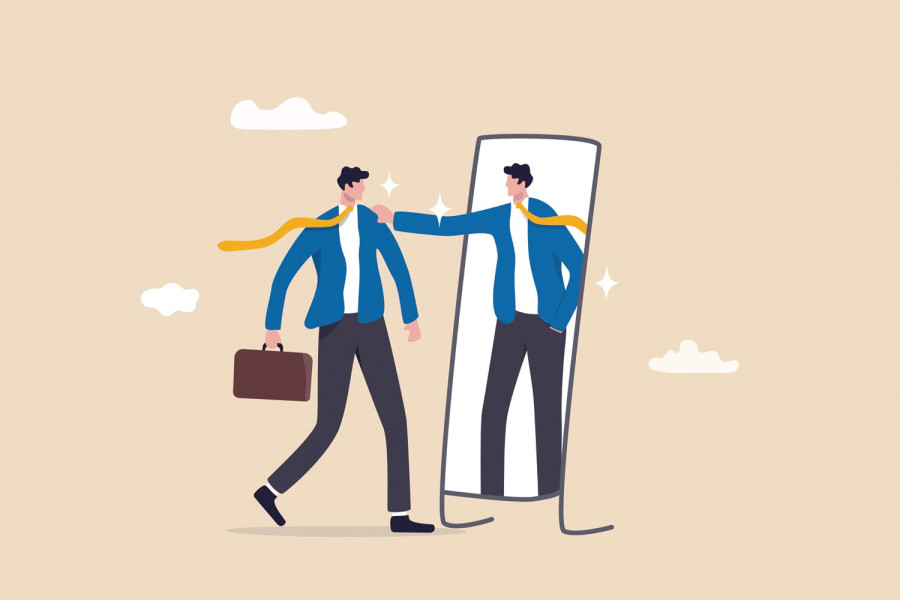Culture & Lifestyle
The power of self-reflection
Taking time to pause and introspect can help you break monotony, realign your goals, and embrace a more meaningful life.
Tashi Gurung
Every new year, people make lists of what they want to accomplish. We also see a lot of top ten lists elsewhere: top 10 Movies, Top 10 Notable Moments, and so on. Most of us also fall into this habit of making resolutions for the approaching year, like going to the gym more regularly, eating healthy, reading more books, or spending more time with family.
As we make these lists, we are utilising a skill heavily used in therapy: self-reflection. Self-reflection, in very simple terms, is to give serious thought or consideration to something. It means to introspect, contemplate, and analyse—a very internal thought mechanism. As a therapist, I cannot emphasise how important this skill is and can be.
Oftentimes, our lives can move on auto-pilot. We have obligations, deadlines and tasks to fulfil. We have to give time to our school or work and family. We must care for ourselves, eat the right food and be as healthy as possible. However, in this rush, we forget to give time to ourselves. We seldom ask ourselves: how am I truly?
This happened to me recently. I was so busy and overwhelmed with my daily routine that I felt irritated. I, somehow, started to battle with thoughts of meaninglessness. I became disillusioned with life. But as time passed, I realised: I had to introspect and reflect on my life.
This is a common occurrence. Running on auto-pilot seems to be the default mode for most people until they make it a point to be alone with themselves or something causes them to be so.
Over the years, I have observed that the pandemic has caused a huge disruption in health and people’s choices. I have seen people deciding to change their career path or even retire.
With the onset of the pandemic, my mother decided to be less involved with her business and chose to live a semi-retired life. Some of my uncles also followed a similar path. All simply because of reflection. She realised that her priorities had shifted: from earning money to devoting time to spirituality and religion.
But we do not always need a pandemic to practice self-reflection. Reflecting is not a difficult task. The first step is to be comfortable with being alone—with ourselves. After that, it is much more smooth-sailing.
As we are alone, away from distractions—especially our phone; we can start to journal/record our thoughts, feelings and aspirations. The main thing is that we shouldn’t restrict what we write. Just let the words flow in whatever direction they want. After all, we are writing for our sake and no one else.
Following this stream-of-consciousness technique, we can decipher and analyse ourselves more clearly. Some happens while we are writing, and some when we reread it. We can track down the trigger of our feelings; what makes us anxious, and worried. We can also feel a sense of being inspired as we can track down and reaffirm the goals that we want to accomplish.
Finally, a sense of gratefulness fills our hearts over the things we have accomplished, and the struggles and hurdles we have overcome.
Just the simple act of writing and noting down our internal monologue helps us self-reflect. To look back into the past and be grateful; to look more clearly into the present, and to aspire and hope for the future.
For those who journal extensively, the simple act of rereading past journals can help reduce pervasive feelings of disillusionment and meaninglessness.
For me, the trigger was monotony. The daily routine had caused me to develop thoughts of meaninglessness. This realisation, in turn, caused a shift. I decided to make changes to my daily routine to break the monotony. And this perspective gave me a new sense of purpose.
It is also important to note that there’s a difference between self-reflection and self-judgement. Sometimes, we might activate our inner critic and get trapped in judging and criticising ourselves.
Taking time to self-reflect is considered a safe space within ourselves. Being compassionate with ourselves and redirecting our focus to actionable insights can propel our lives forward. Realising the humanness of our existence: that we all make mistakes and falter at times can be liberating. We always have faults and room for improvement; the best we can do is work towards making ourselves better and accepting ourselves for how we are.
In essence, self-reflection is a powerful tool that allows us to pause, modify and align our lives with our deeper values and aspirations. It is through this process of introspection that we uncover our true selves.
As we enter the new year, embracing reflection with compassion and an open mind can be the key to personal growth, resilience and a more meaningful life. Being alone and journaling—taking time for ourselves—can be a gift that continually enriches us.
Gurung is a counselling psychologist. He works at Happy Minds, a mental health and well-being platform.




 22.64°C Kathmandu
22.64°C Kathmandu















